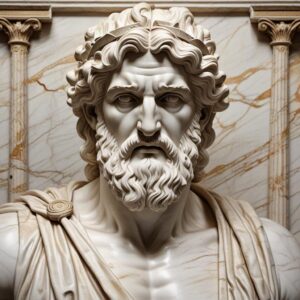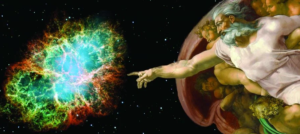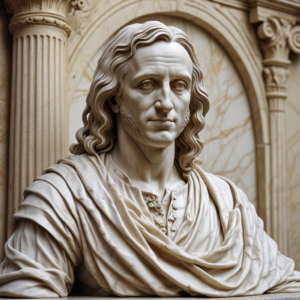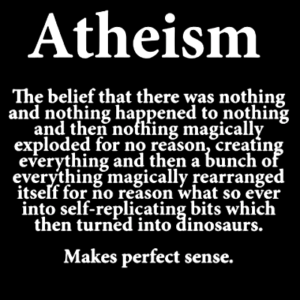
The question of Heaven, Eternity, and God’s existence is a fundamental inquiry that lies at the heart of human thought and experience. While opinions on this matter are abundant and diverse, a definitive answer requires thoughtful consideration of a wide array of evidence and perspectives. A thorough examination of human experience, scientific findings, logical reasoning, and historical records ultimately leads to a compelling conclusion:
God does exist.
The question of whether God exists is a timeless one, with theism (believing in God) and atheism (not believing in God) being the two main opposing views. While both positions involve a certain degree of faith, it’s actually atheism that often requires a bigger leap of faith. Let’s delve into the philosophical, scientific, and personal experiences that back this up, showing how believing in something beyond our world is not just logical, but actually makes more sense than denying it.
Stanford Encyclopedia of Philosophy: Definitions of “Atheism”
The word “atheism” is polysemous—it has multiple related meanings. In the psychological sense of the word, atheism is a psychological state, specifically the state of being an atheist, where an atheist is defined as someone who is not a theist and a theist is defined as someone who believes that God exists (or that there are gods). This generates the following definition: atheism is the psychological state of lacking the belief that God exists. In philosophy, however, and more specifically in the philosophy of religion, the term “atheism” is standardly used to refer to the proposition that God does not exist (or, more broadly, to the proposition that there are no gods). Thus, to be an atheist on this definition, it does not suffice to suspend judgment on whether there is a God, even though that implies a lack of theistic belief. Instead, one must deny that God exists.
Ancient philosophers who denied God’s existence
 In the annals of ancient philosophy, two figures stand out for their bold rejection of the prevailing religious beliefs of their time: Diagoras of Melos and Theodorus the Atheist.
In the annals of ancient philosophy, two figures stand out for their bold rejection of the prevailing religious beliefs of their time: Diagoras of Melos and Theodorus the Atheist.
Diagoras, a 5th-century BC Greek poet and sophist, earned the moniker “the Atheist” for his outspoken criticism of religion and his declaration that there were no gods. His views were considered so radical that he was forced into exile from Athens, and accused of impiety.
Theodorus, a Cyrenaic philosopher from the 4th century BC, also denied the existence of gods and authored a treatise titled “On the Gods” expounding his views. He argued that happiness, not divine intervention, was the ultimate goal of life and that religious beliefs were mere superstitions that hindered human flourishing.
Early atheists, though often facing opposition and even persecution, made a significant impact on philosophical discussions about the nature of reality and the existence of God. Their skepticism and rational inquiry challenged the blind acceptance of religious doctrine, which opened the door for a variety of non-religious perspectives. However, it could be argued that their approach, while groundbreaking, might have overlooked the cultural and existential aspects that religious beliefs often address. While their contributions are undeniably important, they may not have fully addressed the complex human needs for meaning and connection that are often met through religious traditions.
The Burden of Proof
Before we dive into the evidence, let’s talk about who needs to prove what. You often hear atheists saying, “Prove to me God exists!” But that’s not quite fair. It’s not just on believers to prove God is real, it’s also on atheists to prove God isn’t. Think about it: saying something doesn’t exist is a pretty big claim. It’s like saying you know everything about everything that ever was or will be. That’s a lot harder to prove than pointing to evidence that suggests something does exist. So, both sides have some explaining to do!
The Philosophical Argument

Philosophically, theism offers a more comprehensive and satisfying explanation for the universe’s existence and the nature of reality. The cosmological argument, for instance, posits that the universe’s existence necessitates a first cause, an uncaused cause that brings everything into being. This uncaused cause, theists argue, is God. While atheists propose alternative explanations, such as the multiverse theory or quantum fluctuations, these explanations often raise more questions than they answer. They push the problem of origins back a step without providing a truly ultimate explanation.
Moreover, the teleological argument, or argument from design, points to the intricate order and complexity of the universe as evidence of intelligent design. The fine-tuning of physical constants, the intricate mechanisms of biological life, and the emergence of consciousness all suggest a purposeful creator rather than a random, purposeless process. While atheists often invoke natural selection and evolution to explain biological complexity, these processes merely describe how life adapts and diversifies, not how it originated or why the universe is hospitable to life in the first place.
The moral argument also lends support to theism. The existence of objective moral values and duties, which are recognized across cultures and time periods, suggests a moral lawgiver who transcends human subjectivity. Atheism, on the other hand, struggles to provide a foundation for objective morality. If there is no God, then morality is ultimately a human construct, relative to individual preferences or cultural norms. This relativism, however, leads to absurd and dangerous consequences, as it denies the existence of universal human rights and justifies any action as long as it is deemed acceptable by a particular group or individual.
GotQuestions.org: Does God Exist?
The question does God exist? cannot be answered with absolute proof, but we can point to the weight of evidence that suggests He does exist. Accepting the existence of God is not a blind-faith leap into the dark. It’s a trusting step out of the dark into a well-lit room where many things are made clear.
The Scientific Evidence

Contrary to popular belief, science does not disprove the existence of God. In fact, a lot of scientific findings actually hint at something bigger than us. Take the Big Bang theory, for example. It tells us the universe had a starting point, a moment of creation. This lines up pretty well with the idea of God creating the universe, and it challenges the idea that the universe has always just existed on its own.
The anthropic principle is the idea that the universe seems perfectly set up for life to exist. The fundamental constants of the universe, like gravity and electromagnetism, have these incredibly precise values that make it possible for stars, planets, and life to form. It’s pretty unlikely that this happened by accident, which makes you wonder if the universe was designed with a purpose.
And what about consciousness? Scientists know a lot about how the brain works, but they still can’t fully explain the subjective experience of being aware and feeling things. This suggests that consciousness might be more than just brain activity – it might be a fundamental part of reality itself. The idea of a divine mind or soul could offer a pretty good explanation for this.
The Experiential Dimension

It’s not just about the heady philosophical stuff and the scientific data, though. Personal experience plays a huge part in why people believe. Think about it – countless people throughout history have talked about having these incredible encounters with something divine. These experiences totally changed their lives and made their faith even stronger.
Now, you can’t exactly put these experiences in a test tube, but they’re incredibly powerful for those who have them. And let’s be real, you can’t deny the amazing ways that faith can change people. Millions have found real meaning, a sense of purpose, and hope through their belief in God. They talk about experiencing forgiveness, healing, and a feeling of belonging to something bigger than themselves. These are real experiences, and even though they’re personal, they strongly suggest that there’s something beyond our everyday reality that’s interacting with us and making a difference in our lives.
The Atheistic Assumption
In contrast to theism, atheism, particularly in its strong form, rests on a greater leap of faith. To deny the existence of God, one must assume that the universe came into being without a cause, that life emerged from non-life through random processes, that consciousness is merely an illusion, and that morality is a subjective human construct. These assumptions, while possible, are far less plausible than their theistic counterparts.
Another thing atheism has a hard time explaining is the fact that so many people, throughout history and across cultures, have claimed to experience something divine. If there’s no God, what do we make of these experiences? Were they all just imagining things, getting it wrong, or making it up? Some atheists try to explain it away with psychology or sociology, but those explanations don’t really capture how deeply these experiences can change people.
Also, atheism doesn’t paint the rosiest picture of life. If there’s no God, then what’s the point of anything? There’s no real meaning, no bigger purpose, and no ultimate value to our lives. Morality becomes just a matter of personal opinion or what society happens to think, and there’s no hope for anything beyond this life. Sure, some atheists find meaning in relationships, science, or art, but those things can only go so far. They don’t offer the kind of deep satisfaction that comes from believing in a loving God who knows you and cares about you.
Conclusion
 So, what can we conclude? It seems like atheism, especially the strong kind that completely denies God’s existence, actually takes a bigger leap of faith than believing in God. Whether you look at it from a philosophical, scientific, or personal angle, the evidence suggests that there’s something beyond us, a higher power that created everything, gave the universe its design, and set the moral standards we follow.
So, what can we conclude? It seems like atheism, especially the strong kind that completely denies God’s existence, actually takes a bigger leap of faith than believing in God. Whether you look at it from a philosophical, scientific, or personal angle, the evidence suggests that there’s something beyond us, a higher power that created everything, gave the universe its design, and set the moral standards we follow.
Sure, believing in God means trusting in things we might not fully understand. But it’s a trust that makes sense, based on reason, evidence, and our own experiences. On the other hand, atheism asks you to deny all of that evidence and jump into a world view that’s pretty bleak and doesn’t offer much hope.
Ultimately, whether you believe in God or not is a deeply personal choice. But it’s important to make that choice with your eyes wide open, understanding what each side has to offer. While faith is always part of the picture, believing in God isn’t just a blind leap. It’s a trust built on evidence and reason. Both theism and atheism have their own logic and evidence, but when you really look at it, the idea of God actually makes more sense of the world around us and the experiences people have had throughout history. So, while atheism might seem like the more “logical” choice to some, it actually takes more faith to dismiss all the evidence that suggests there’s something bigger than us out there.
If you have faith, have you made a difference?
“The Star Thrower” … an adaptation.
Once upon a time, there was an old man who lived by the sea. Every morning, he would take a walk along the beach, enjoying the salty air and the rhythmic sound of the waves. One day, as he strolled along the shoreline, he noticed something peculiar. Thousands of starfish had been washed ashore during the night, stranded on the sand and slowly dying under the rising sun.
The old man sighed, feeling a pang of sadness for the helpless creatures. He knew that if he didn’t do something, they would all perish before the tide returned. So, he began picking up the starfish, one by one, and tossing them back into the ocean.
As he worked, a young boy approached him. “What are you doing?” the boy asked, puzzled by the old man’s actions.
“I’m saving these starfish,” the old man replied. “They were washed ashore during the night, and if I don’t throw them back, they’ll die.”
The boy looked at the vast expanse of beach, littered with countless starfish. “But there are so many,” he said. “You can’t possibly save them all. What difference does it make?”
The old man smiled gently and picked up another starfish. “It makes a difference to this one,” he said, tossing it back into the waves.
The boy watched as the starfish disappeared beneath the surface, a renewed sense of hope in his eyes. He understood the old man’s message. Even though he couldn’t save every starfish, each one he returned to the ocean was a life saved, a small victory against the forces of nature.
Inspired by the old man’s compassion and determination, the boy joined him in his task. Together, they worked tirelessly, tossing starfish back into the sea until the tide began to turn.
As the water crept back up the beach, the old man and the boy watched with satisfaction as the starfish they had saved were carried back out to their underwater home. They knew that they had made a difference, however small, in the grand scheme of things. And as they walked away from the beach, they felt a sense of peace and fulfillment, knowing that they had done their part to help those in need.
